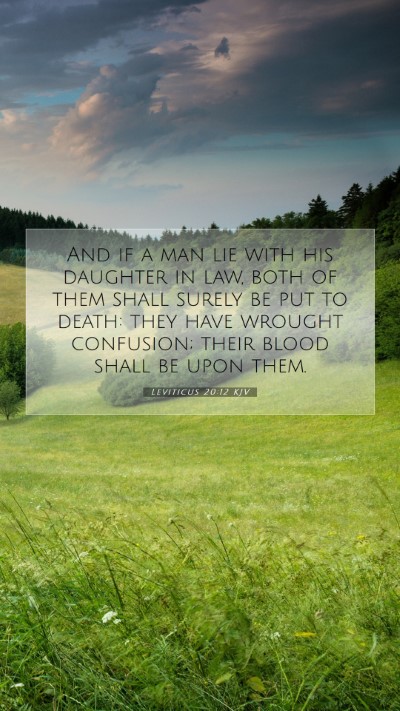Understanding Leviticus 20:12
Leviticus 20:12 states: "If a man lies with his daughter-in-law, both of them shall be put to death. They have committed crime; their blood is upon them."
This verse, part of the Holiness Code, highlights the serious nature of forbidden relationships in ancient Israel. The law emphasizes the importance of moral conduct and the preservation of familial integrity within the community. Below, we explore the interpretations and meanings drawn from esteemed public domain commentaries.
Context of Leviticus 20:12
Leviticus 20 outlines various laws concerning forbidden relationships and the punishments attached to them. This specific verse addresses a type of incestuous relationship that not only breaches social norms but also religious laws, thus warranting the harsh punishment of death. Such mandates served to maintain purity among the people as part of their covenant with God.
Insights from Commentaries
-
Matthew Henry:
Henry portrays this law as a severe warning against the extreme moral corruption that can arise from intimate relationships within the family unit. He emphasizes that the consequences are intended not only for the offenders but as a deterrent for the society at large. The community's integrity is paramount, and thus, such abominations must not only be condemned but also punished decisively.
-
Albert Barnes:
Barnes highlights the sociocultural context, explaining that the laws were designed to distinguish Israel from surrounding nations that often practiced such immoral customs. He interprets this verse as underscoring the holiness required of God's people and the direct link between their communal behavior and divine favor or judgement.
-
Adam Clarke:
Clarke’s analysis focuses on the concept of spiritual and moral cleanliness. He elucidates that the harsh penalties serve as a reminder of the natural order ordained by God, where familial roles and relationships are sacred and must not be violated. According to Clarke, the divine law serves as a protective barrier, shielding the community from moral decay that such offenses could incite.
Theological Significance
The law presented in Leviticus 20:12 speaks to the serious implications of sexual immorality in the eyes of God. The punishment of death serves not only as a legal consequence but as a dire warning to all who might contemplate such actions. The text communicates the importance of maintaining boundaries that God has established for His people, reflecting a broader theological theme of holiness and separation.
Practical Applications
For modern readers, this verse can reinforce the need for sexual ethics and the importance of upholding family integrity. While the punishments of the ancient texts may seem severe, the underlying principle remains relevant: maintaining purity and a moral compass in our relationships is essential for the well-being of the community and aligns with divine intentions.
Related Bible Cross References
- Leviticus 18:15 - Prohibits uncovering the nakedness of a daughter-in-law.
- Deuteronomy 22:22 - Discusses the punishment for adultery.
- 1 Corinthians 5:1 - Addresses a case of incest in the Corinthian church.
Conclusion
Leviticus 20:12 serves as a study in the moral laws that were imperative for the Israelites and still resonate with ethical discussions today. By engaging with this verse through various commentaries, readers gain a fuller understanding of not only its historical context but also its significance in contemporary biblical study. The rigorous analysis of such passages enriches our Bible study resources, providing deeper insights into the meaningful application of Scripture in daily life.


